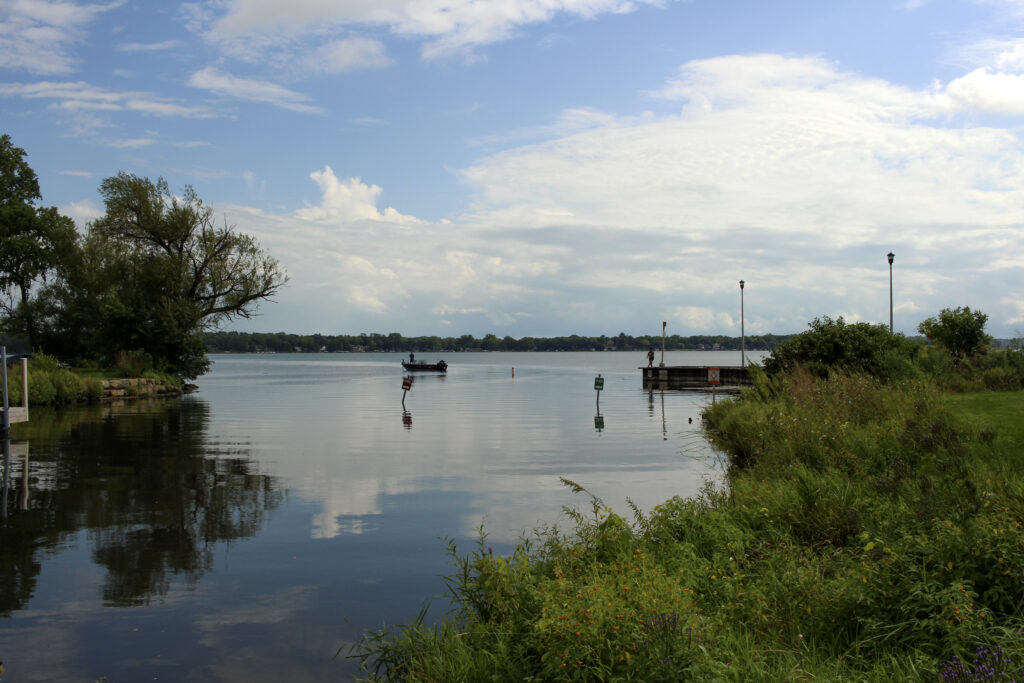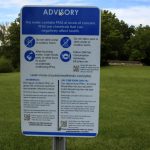Wisconsin Conservation Leaders Tally 2023 Wins and Losses
DNR has become a political football as state experiences record temperatures.

Starkweather Creek empties into Lake Monona at Olbrich Park in Madison. Photo by Henry Redman/Wisconsin Examiner.
Two of Wisconsin’s leaders on conservation issues say they believe the state took some big steps forward in 2023 when it comes to ensuring clean air and water for the state’s residents. But, with a divided government, they say, some of those steps were counteracted by obstruction, delay and outright hostility.
The year in conservation saw the beginning and the end of former Sheboygan County Administrator Adam Payne’s tenure as secretary of the Wisconsin Department of Natural Resources (DNR); the long awaited approval of a new plan for managing the state’s wolf population; months of negotiations on a proposal to help remediate PFAS pollution in community water supplies across the state and attacks on the DNR’s authority to hold polluters accountable.
“2023 will undoubtedly be the warmest year on record, a rapidly changing climate has many — will have many — significant impacts on the environment, environmental health and community health, threaten water quality in many ways, cause harmful algal blooms and disrupt aquatic ecosystems,” he says. “The changing precipitation patterns are fueling significant flooding events. Those trends continued in 2023 and make it even more critical that we take significant action to reduce greenhouse gasses and at the same time promote water resilience and public health.”
He adds that the changing climate makes it even more important for the state to make smart decisions when it comes to issues such as agriculture and land use to protect the state’s waters from the overspreading of manure — which can lead to harmful excesses of nutrients like phosphorus and nitrogen.
This year, the Wisconsin Examiner reported on local fights over phosphorus in the state’s water. In small doses, phosphorus can promote aquatic plant growth, but too much can cause harmful algal blooms. In Dane County, a dispute over how the Madison sewer district handles its treated water led to an outcry from advocates for several local waterways.
Environmental and agricultural collaboration
Phosphorus and nitrogen are the two constant threats to the state’s water, according to Sara Walling, the water and agriculture program director at Clean Wisconsin. In a state in which agriculture is so important, Walling says 2023 saw important collaborations between environmental groups and agricultural producers to keep the state’s surface, ground and drinking water clean. She specifically pointed to Clean Wisconsin’s partnership with the Dairy Business Association working on water issues as a success this year and efforts from local residents to oppose the construction of massive factory farms in parts of the state.
“There’s skepticism from agriculture groups in leaning into environmental programming,” Walling says. “In my experience, they’ve really demonstrated their commitment to helping their members improve their environmental footprint. The struggle between agriculture and water quality issues and that impact is as strong today as it has been in the 20 years I’ve been working in this realm. You see a lot of community groups trying to stand up and be a part of the local decision making processes on farm permits. We’re seeing a lot of rural landowners, homeowners, become much more aware of what’s happening in their communities and get involved. Those decisions at the local level ring a lot louder. The farmers in those communities want to be part of those communities.”
CAFOs move to limit DNR authority
Despite the success Walling says has occurred in working with farmers to protect local water, there remains a powerful contingent fighting against water protections. Wisconsin Manufacturers and Commerce, the state’s largest business lobby, and a handful of agricultural advocacy organizations working on behalf of CAFOs, sued the DNR this year to limit the agency’s ability to regulate what large factory farms dump into waterways.
“WMC has continued, initiated and threatened lawsuits that would threaten the protection of water in Wisconsin,” Wilkin Gibart says. “Those lawsuits in 2023 mean that state court decisions could have an impact, positive or negative, on our state’s water quality in 2024.”
Yet Walling says increased awareness about the possible harms of factory farms is an important step forward from this year.
“There’s certainly a contingent out there that is not interested in having the oversight and accountability the majority of Wisconsinites feel is necessary,” she says. “These large farms generate a ton of manure. That awareness of what that manure is and its potential for water quality impacts is huge. Certainly we will be working as a party to that lawsuit and do everything we can to help the DNR retain oversight of those largest farms so we have some ability to keep tabs on what they’re doing.”
PFAS fight comes to a head
Outside of phosphorus and nitrogen, which have been threats to state water for ages, Walling and Wilkin Gibart say 2023 saw a huge step forward in statewide awareness and action on PFAS, the family of man-made compounds known as “forever chemicals” which have been connected to health defects including cancer.
PFAS have been used in household goods such as nonstick pans as well as certain kinds of firefighting foam for years. Yet as the health effects of PFAS have become more understood, communities across the state have found them at high levels in local water supplies.
“The Legislature has held up the distribution of PFAS funding because some legislators want to weaken the authority of the DNR to hold PFAS polluters responsible,” Wilkin Gibart says. “The money belongs to the people but a small group of legislators want to hold it up because they’re more concerned about the liability of a small group of corporations. The Legislature has not allowed those funds to make their way to Wisconsin communities that need them.”
But Walling says she sees a silver lining. The request from Evers to release the money, known as a 13.10, will force legislators to do something on the issue, either providing the money or voting to keep it out of the hands of affected communities.
“It puts the onus on the Legislature to act in some way or another,” she says. “The 13.10 request is a big move. It’s pretty bold and I’m happy to see that out of the administration. I’m hopeful the actions of the governor yesterday and the DNR to put this pressure on the Legislature to exempt this particular groundwater rule will make sure this conversation keeps going.”
The grant programs in the bill are well designed, Walling adds. But she says the “poison pills” in the bill, including removing the DNR’s authority to have responsible parties pitch in rather than burdening taxpayers with cleanup costs, make it unworkable. “Ideally this will help get the dollars out the door,” she says of Evers’ push.
If the Legislature doesn’t respond to Evers’ push, “I think you’ll see a lot more uprising within the communities that have been constantly impacted by PFAS contamination,” she says. “I think those actions are going to ensure the conversation remains strong into the new year.”
Battle over Evers’ nominees
Republicans in the Legislature have also repeatedly worked to punish policy makers for acting to more forcefully protect the state’s environment. In October, the Senate voted to reject four of Evers’ nominees to the Natural Resources Board — the policy making body for the DNR. Republicans cited the nominees’ support for PFAS groundwater standards and establishing a new wolf management plan without a hard population limit on the animal as reasons for voting no.
This week, in a hearing on Evers’ replacements for the rejected nominees, Republicans continued the strategy, pressing the replacements over their views on the same issues.
Walling says it’s frustrating to see Republicans stonewall against qualified nominees who have dedicated their lives to conservation.
“It’s very frustrating because obviously this is a very important policy making body,” she says. The nominees are all “very strong candidates.”
If the Legislature confirms them and allows them to do their jobs, “I can’t think of a better way of managing the goals of our state, protecting our water quality, making sure we have clean air, clean water, clean energy.”
Wisconsin conservation leaders see mixed progress on environmental issues in 2023 was originally published by the Wisconsin Examiner.





















